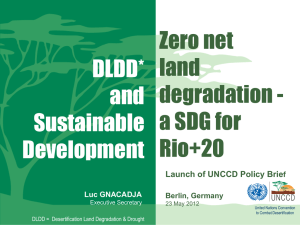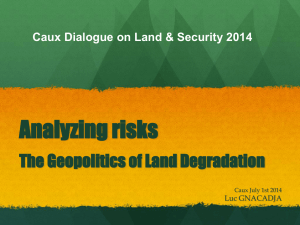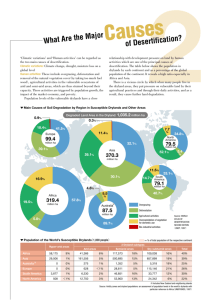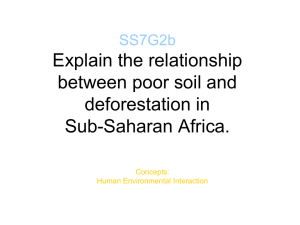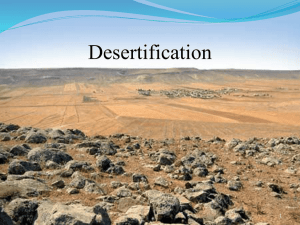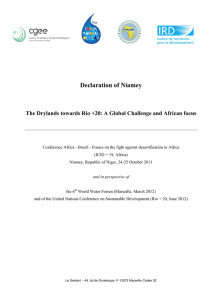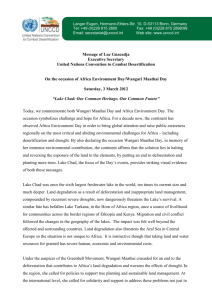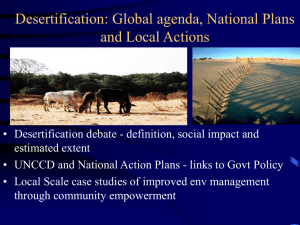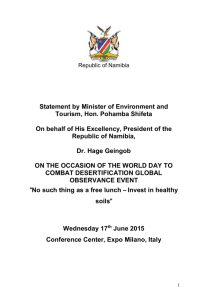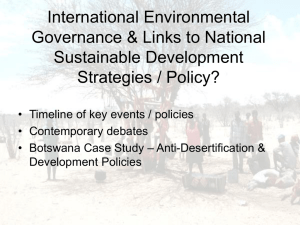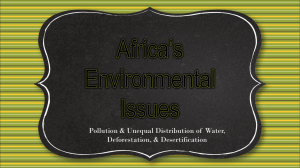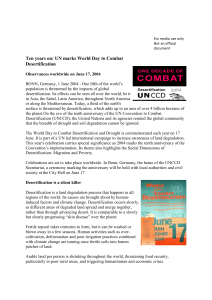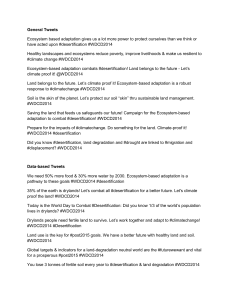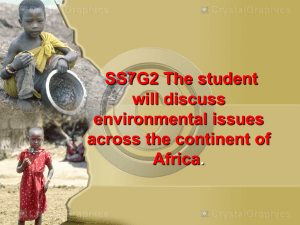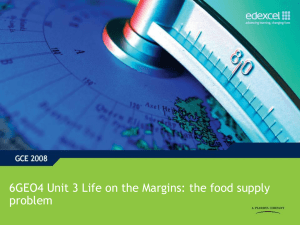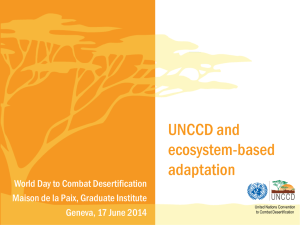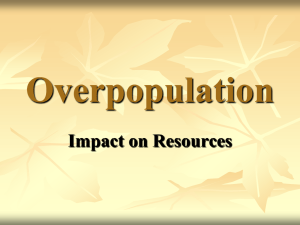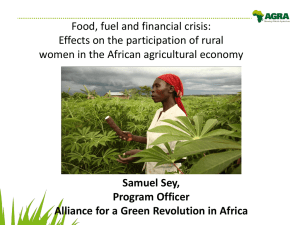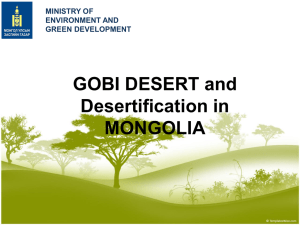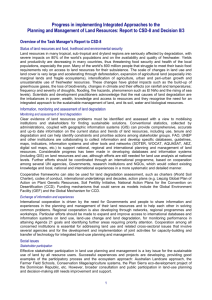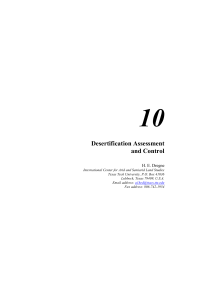The impact of Land degradation, desertification and drought on
advertisement
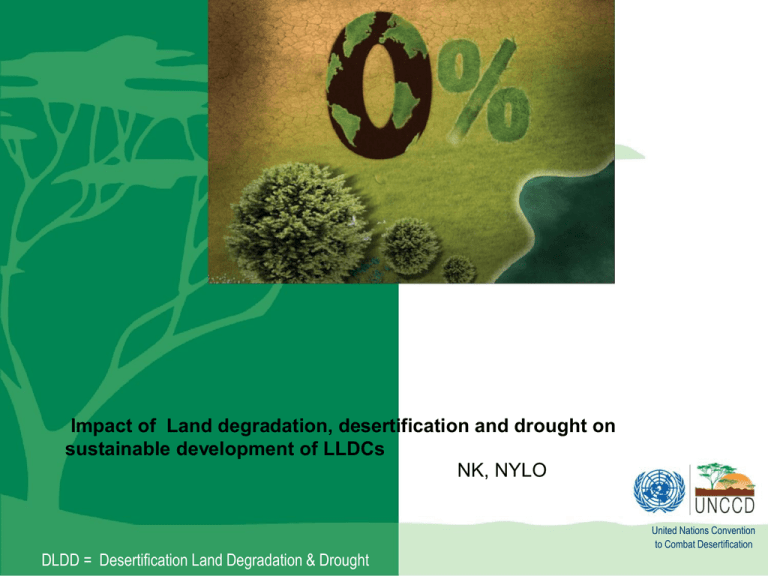
Impact of Land degradation, desertification and drought on sustainable development of LLDCs NK, NYLO DLDD = Desertification Land Degradation & Drought United Nations Convention to Combat Desertification Areas affected by desertification and land degradation Desertification affects over 40% of total world land area Africa: Two thirds drylands, 73 % is moderately or severely affected Asia: One third is drylands, 71% affected, All Pacific islands states face some sort of land degradation North America proportion of drylands is 74% Five European Union countries are affected Latin America and the Caribbean: one fourth drylands, 75% affected 110 countries have drylands that are potentially at risk. Over 250 million people are directly affected and One billion under threat or at risk Global desertification costs: US$42 Billion; Land is a finite resource DLDD: Some facts & figures ? Sustainable Development Food Energy Water Forest Land Cli DLDD B More than 50% of agricultural moderately to severely degraded LD directly affects 1,5 billion people globally 75 billion tons of fertile soil disappear/year 12 million ha/Year lost due to drought and desertification Six million km2 of drylands bear a legacy of desertification Biodiversity: 27,000 species lost each year due to LD “Improved management of the world’s land (including terrestrial carbon) represents 1/3rd of the overall global abatement potential in 2030 Main Causes of Desertification/land degradation Human activity :over cultivation, over grazing Deforestation Poor agricultural practices Drought and Climate Change Extreme Poverty Food insecurity & Hunger Increased emissions of GHG Deforestation Increased to Drought & Water stress Biodiversity Loss Instability & Crises Migrations DLDD has far-reaching impacts Drylands and Conflicts (Cf. “Common Wealth” by J. Sachs) Drought potential worldwide 2000-2098 Source : University Corporation for Atmospheric Research - http://www2.ucar.edu/news/2904/climate-change-drought-may-threaten-much-globe-within-decades S “Future We Want” • • • • • • • • • • • • • • • • • Desertification, land degradation and drought 205. We recognize the economic and social significance of good land management, including soil, particularly its contribution to economic growth, biodiversity, sustainable agriculture and food security, eradicating poverty, the empowerment of women, addressing climate change and improving water availability. We stress that desertification, land degradation and drought are challenges of a global dimension and continue to pose serious challenges to the sustainable development of all countries, in particular developing countries. We also stress the particular challenges this poses for Africa, the least developed countries and the landlocked developing countries. In this regard, we express deep concern for the devastating consequences of cyclical drought and famine in Africa, in particular in the Horn of Africa and the Sahel region, and call for urgent action through short-, medium- and long-term measures at all levels. 206. We recognize the need for urgent action to reverse land degradation. In view of this, we will strive to achieve a land-degradation neutral world in the context of sustainable development. This should act to catalyse financial resources from a range of public and private sources. U Cost of Action Vs Inaction The Economics of Land Degradation Intervention Options for ZNLD Type 1 - High degradation trend or highly degraded lands: 25% Rehabilitate if economically feasible; mitigate where degrading trends are high Type 2 - Moderate degradation trend in slightly or moderately degraded land: 8% Introduce measure to mitigate degradation Type 3 - Stable land, slightly or moderately degraded: 36% Preventive interventions Type 4 - Improving lands: 10% Reinforcement of enabling conditions which foster SLM Source FAO SOLAW 2011 Source: W and the Gl http://www Food Security Poverty eradication Preserving the resource base for food security - Land productivity/Soil fertility improvement at the core of all long term strategies Improving livelihood through pro-poor policies on Sustainable Land & Water Management Climate change Holistic Managemt Sust. Land Management & Restoration of degraded Lands as an alternative to Deforestation Improving water availability & quality through sustainable land & water management Biodiversity Land is a win-win context for adaptation, mitigation & resilience building Avoided Deforestation Drought & Water stress Bio Energies Opportunities for Bio energies through biomass production Biodiversity conservation through improvement of land ecosystems’ conditions Avoiding Forced Migrations Changing the DAM paradigm “Degrade-Abandon-Migrate” Thank you "If you will not fight for right when you can easily win without bloodshed; if you will not fight when your victory is sure and not too costly; you may come to the moment when you will have to fight with all the odds against you and only a precarious chance of survival. There may even be a worse case. You may have to fight when there is no hope of victory…”.
